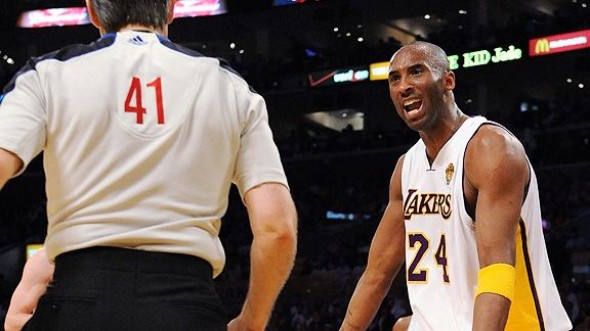Kobe’s Foul Paves Way for AYF Layup
A Blunder in Public Relations Provides Unique Opportunity and Helps AYF Focus Media Spotlight on Genocide Recognition
BY ARIS HOVASAPIAN
“Luck is what happens when preparation meets opportunity.”
– Seneca, Roman philosopher and statesman, 1st Century AD
Last week, the Armenian Youth Federation (AYF) took the opportunity to initiate a campaign to expose a newly signed endorsement deal for Kobe Bryant to promote Turkish Airlines in the global market. The AYF expressed its disappointment with Kobe and has publicly asked him to back out of the deal due to Turkish Airlines’ strong association with the Turkish government (the government holds a 49% ownership stake in the airline). That Kobe practices his craft in a market that is home to the largest Armenian population of the United States should serve as even more evidence that his public relations team failed him spectacularly in allowing the Turkish Airlines deal to materialize.
Due to the organization’s meticulous preparation for just such an event, the AYF was able to gain a great deal of local and national media attention as a result of this effort. There was television coverage on nearly all the Los Angeles TV stations. There was print and web coverage from USA Today, CNN, UPI, Los Angeles Times, Sports Illustrated, ESPN, Huffington Post, LAWeekly, and other news outlets.
Despite Kobe’s popularity both locally and nationally, all media coverage of the “Kobe controversy” has treated the AYF and AYF’s claims with full legitimacy, almost always mentioning genocide recognition efforts. Some media were even sympathetic to the AYF campaign, with LAWeekly’s Dennis Romero going so far as to demand that Kobe fire whomever allowed him to make this deal.
Some reactions of a segment of the general population, including those of some Armenian-Americans, have not been so sympathetic to the campaign. Several reasons and rationalizations have been conjured, on message boards, Facebook, Twitter, and any other public forum, to justify these contrarians’ dissatisfaction with the AYF’s tactics on this issue.
Are these criticisms valid, and has the AYF overreached with targeting a professional athlete in genocide recognition efforts? Or is it fair to ask a public figure to be sensitive to the feelings of a notable portion of his market?
A proper answer to these questions call for a full examination of the validity of the arguments cited in opposition to the AYF’s campaign (in ascending order of veracity):
AYF or Armavia should have paid Kobe more.
Do people honestly believe that the AYF has the cash reserves to outbid an international airline? Wouldn’t Armavia prefer to upgrade their fleet if they had the disposable income?
Where was the outrage when: Allen Iverson signed to play in Turkey, Michael Vick was caught in a dog-fighting ring, Kobe Bryant was accused of sexual assault, etc.
Many have been asking why the AYF is upset over Kobe’s current deal but hasn’t said much about past transgressions of professional athletes or celebrities. This is truly one of the sillier criticisms of the AYF’s campaign. Surely any human being would be upset by a behavior that victimizes another, but an organization sticks to its own issues, and speaks out about situations that affect those issues.
When Allen Iverson signed to play on a Turkish club, the AYF did not publicize this matter because it happened in Turkey and because Iverson was past his prime and had lost most of his appeal and legitimacy in the United States. Iverson also never played in any market with a significant Armenian population.
The AYF does not expect PETA or ASPCA to speak out about genocide recognition efforts in Congress, and the AYF was not expected to speak out about animal welfare in the wake of Michael Vick’s conviction for dog-fighting.
The AYF also had no reason to speak out about Bryant’s previous legal troubles in Colorado because they had no connection whatsoever to the AYF’s agenda.
Celebrities and athletes get into trouble all the time, and it is unreasonable to ask an Armenian-American organization why they were silent about all those instances. The reason that that organization is not silent now is because a situation has arisen that affects the policies of said organization.
Kobe is not Armenian, this issue doesn’t matter to him.
Indeed, Kobe is not Armenian. However, the issue of genocide recognition is a human issue, and not just an Armenian issue. Most have forgotten what they mean when they say that the Armenian Genocide was a “crime against humanity.” Kobe’s background did not prevent him from speaking out against the genocide in Darfur in May 2008.
Simply put, one’s ethnic background has nothing to do with recognition of the Armenian Genocide; one’s ethnic background also does not matter when it comes to doing business with a government that has a long, illustrious, and on-going record of human rights abuses.
Kobe made a business decision, so what if Armenians are upset?
Public figures, including celebrities, must be sensitive to the needs and wants of their market. Kobe’s market is truly global, but as a result of his playing for the Lakers, he is identified with Los Angeles, a polyglot city that includes the largest population of Armenians outside Armenia. There are certainly many Armenian-Americans that purchase tickets to see the Lakers play, and there are even more that watch games from home or purchase Lakers merchandise.
A true business decision must take into account all factors, including those that don’t have dollar signs in front of them. As a result of Kobe’s endorsement deal, Kobe’s name is now associated with a government that is a denier of history and an abuser of human rights.
Kobe was certainly living comfortably prior to this deal, and had he known of the reaction that would follow, he certainly would have chosen to leave the money on the table, especially considering how hard he has worked to rehabilitate his image since the sexual assault allegations in Colorado.
Armenians should clean up their own shop first.
Some critics of the AYF’s handling of the Kobe situation have charged that the time and energy would be better spent in convincing Armenian grocery stores to refrain from stocking Turkish goods. Interestingly, the AYF has promoted just such a campaign for several years, with middling success; it is difficult to convince people to change their behavior without providing a proper incentive, and the AYF’s only incentive in the case of Turkish grocery products is guilt. It is also an amorphous policy that cannot be filtered down to a single item or person, in stark contrast to the Kobe-Turkish Airlines pact.
A policy boycotting Turkish products in Armenian grocery stores could never possibly get as much media attention as the Kobe situation has already gotten. The issue regarding Turkish grocery products is simply not newsworthy in any type of mainstream media. For this reason alone, it is clear that the AYF was right in concentrating efforts onto the Kobe situation. Simply put, that decision garnered more media attention in a few days than anything else the AYF has done in the last several years.
AYF should focus its efforts to reform the government in Armenia.
The AYF’s resources are finite and local. It would be exceedingly difficult for a grassroots youth organization to have any kind of effect on a government halfway around the world. However, it is much easier for this organization to affect policies and decisions locally. There are countless individuals that would like to bring reform to the Armenian government, and surely to other governments around the world, but this is impossible to accomplish from outside. Thus, those that live in the United States, or in Los Angeles, can only take on tasks that are within reach. The Kobe-Turkish Airlines deal is an international issue that can most certainly be affected on a local level due to Kobe’s presence in the Los Angeles region.
Don’t exploit the deaths of my ancestors for a public relations stunt.
This line of thought is truly confusing. The AYF organizes an annual protest at the Turkish Consulate every April 24, and one of the aims of this protest is to gain media attention and expose the issue to those that are not familiar with it. One could easily make the argument that the protest is an exploitation of genocide victims. However, the Armenian community is facing off against a government in this struggle, and we have often put aside our feelings in favor of pragmatism. We have not the luxury to pick and choose the times when we become emotional about the suffering endured by our forebears, for in so doing we would undoubtedly fall behind in our fight to extract justice for their unnecessary deaths.
Having explored all these criticisms, it becomes clear AYF’s decision to target Kobe Bryant was not only right, but also smart. Kobe Bryant is one of the most recognizable faces on Earth, playing the second-most popular sport on the planet, in the media and entertainment capital of the world. He is a proven winner and an individual who has faced adversity and rehabilitated his image in a way that few could have imagined. The media attention that this campaign has gained is clearly a function of Kobe’s popularity. It simply would have been foolish for the AYF to let this go.
Kobe presented a clear opportunity for the AYF to push its agenda forward by mobilizing a base of already prepared grassroots activists. It is a true credit to the AYF that they were able to gain so much steady and positive media attention in so little time. However, it is equally disappointing that some of the harshest critics of this campaign are Armenian-Americans who typically align themselves with the AYF and its sister organizations.
It is easy to sit at a keyboard and anonymously criticize this effort, but one should find it difficult to look past the results: generous and fair media coverage, exposure of Turkey’s human rights abuses, mentions of the Armenian Genocide in the press, and thousands of comments and conversations, both positive and negative. By these measures alone, this has been a success. Even those that criticize this effort are, in a way, supporting it, for by mere mention of it, there is an intrinsic understanding that the AYF has done something creative and meaningful. Is that not what must be demanded of all grassroots organizations?
While Kobe has so far remained silent about this issue, Turkish Airlines has issued a response that is very much in line with the way that Turkish government and their allies in Congress portray this history. “Kobe Bryant is a cultural figure, not a historian, and is in no way related to a sensitive and complex controversy over highly contested history.” This canned response from Turkish Airlines proves without a doubt that the AYF’s campaign has gotten the Turkish government to become sensitive to this issue.
Kobe Bryant did not negotiate his deal with Turkish Airlines; he has an agent that takes care of these matters. His agent’s office typically handles all his contracts and business dealings. This same agent would also be advising Kobe about public relations gaffes (he has experience with this) and about when to cancel an endorsement deal to save face. Those who want to contact Bryant’s agent should call Landmark Sports Agency at (310) 966-4101 and leave messages for Bryant’s agent Rob Pelinka.
“Luck is what happens when preparation meets opportunity.” The AYF was prepared and Kobe Bryant presented the opportunity.
EDITOR’S NOTE:
Aris Hovasapian has a degree in Political Science from UCLA and currently works in energy and utilities. He is an alumnus of the AYF but is not currently a member of any Armenian organization.



Leave a Reply
Want to join the discussion?Feel free to contribute!